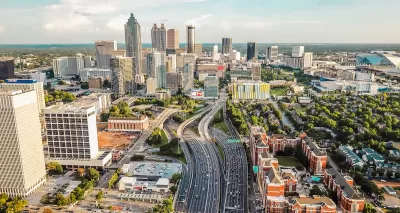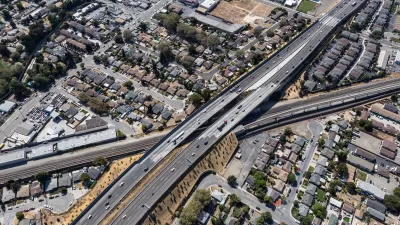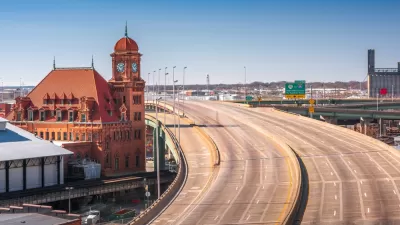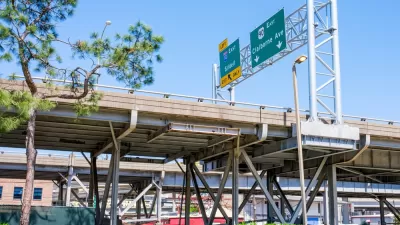Data shows cities lose millions in potential property taxes when highways displace homes and businesses.

For the first time, Smart Growth America’s Divided by Design report quantifies the financial losses brought on by freeway construction and the demolition of homes.
As María Paula Mijares Torres explains in Bloomberg CityLab, “The report uses data from the US census, the Federal Highway Administration and local highway archives to analyze the land physically occupied by a small number of highways and the surrounding buffer zones in DC and Atlanta and compare it to the current tax rate of that area.” The report estimates that D.C. loses at least $7.6 million in annual property taxes on at least $1.4 billion in never-built housing.
“These numbers don’t take into account the commercial property taxes that could have been generated by the thousands of businesses that were destroyed for these freeways, according to Megan Wright, an economic development associate at Smart Growth America who worked on the report.”
Currently, the U.S. Department of Transportation uses ‘value of travel time savings’ to estimate the economic benefit of new highways, but doesn’t address the negative impacts. And while the federal government has expressed a commitment to tearing down and redeveloping highways, “Smart Growth America’s researchers called the $4 billion reconnecting communities initiative a ‘pittance’ compared to the rest of the infrastructure law, which gives localities wide discretion to build and expand highways.”
FULL STORY: Urban Highways Cost Billions in Lost Home Value, Property Taxes

Alabama: Trump Terminates Settlements for Black Communities Harmed By Raw Sewage
Trump deemed the landmark civil rights agreement “illegal DEI and environmental justice policy.”

Study: Maui’s Plan to Convert Vacation Rentals to Long-Term Housing Could Cause Nearly $1 Billion Economic Loss
The plan would reduce visitor accommodation by 25% resulting in 1,900 jobs lost.

Planetizen Federal Action Tracker
A weekly monitor of how Trump’s orders and actions are impacting planners and planning in America.

DC Extends Application Window for Outdoor Dining Permits
District restaurants will have until the end of November to apply, but businesses with permits in rush hour parking lanes must end operations on July 31.

Wind Energy on the Rise Despite Federal Policy Reversal
The Trump administration is revoking federal support for renewable energy, but demand for new projects continues unabated.

Passengers Flock to Caltrain After Electrification
The new electric trains are running faster and more reliably, leading to strong ridership growth on the Bay Area rail system.
Urban Design for Planners 1: Software Tools
This six-course series explores essential urban design concepts using open source software and equips planners with the tools they need to participate fully in the urban design process.
Planning for Universal Design
Learn the tools for implementing Universal Design in planning regulations.
Caltrans
Smith Gee Studio
Institute for Housing and Urban Development Studies (IHS)
City of Grandview
Harvard GSD Executive Education
Toledo-Lucas County Plan Commissions
Salt Lake City
NYU Wagner Graduate School of Public Service





























